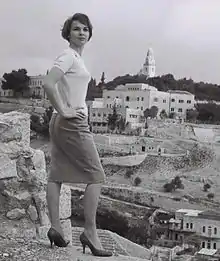Françoise Arnoul
Françoise Arnoul (born 3 June 1931[1]) is a French actress, who achieved popularity during the 1950s.
Françoise Arnoul | |
|---|---|
 During a visit to Jerusalem, 1958 | |
| Born | Françoise Annette Marie Mathilde Gautsch 3 June 1931 |
| Occupation | Actress |
| Spouse(s) | Georges Cravenne (1956–1960, divorced) |
| Partner(s) | Bernard Paul (1964-1980, his death) |
Born Françoise Annette Marie Mathilde Gautsch in Constantine, France (now Algeria),[2] as the daughter of stage actress Janine Henry and artillery general Charles Gautsch, she has two brothers. While her father continued military service in Morocco, the rest of family moved to Paris in 1945.
After learning drama there, she was noticed by director Willy Rozier, who offered her a major role in the film L'Épave (1949).
Arnoul starred in such films as Henri Verneuil's Forbidden Fruit (1952), Jean Renoir's French Cancan (1954), Des gens sans importance (1956) with Jean Gabin, Henri Decoin's La Chatte (1958), Le Chemin des écoliers (1959) with Bourvil, and Jean Cocteau's Testament of Orpheus (1960).
Her American film debut came in Companions of the Night (1954).[3]
Later in life, she moved into television, appearing in different TV movies and mini-series and also turning to character parts. She published her autobiography entitled Animal doué de bonheur in 1995.[4]
In 1956, Arnoul was married to publicity agent Georges Cravenne whom she had met two years previously, but they separated in 1960.[5] From 1964, she became the companion of French director/scriptwriter Bernard Paul, a relationship which lasted until his death in 1980.
Selected filmography
- L'Épave (1949)
- The Red Rose (1951)
- Le désir et l'amour (1952)
- Forbidden Fruit (1952)
- Les Compagnes de la nuit (1953)
- Dortoir des grandes (1953)
- Lovers of Toledo (1953)
- La Rage au corps (1954)
- Secrets d'alcôve (1954)
- The Sheep Has Five Legs (1954)
- French Cancan (1954)
- The Lovers of Lisbon (1955)
- Si Paris nous était conté (1956)
- Des gens sans importance (1956)
- Le Pays, d'où je viens (1956)
- Paris, Palace Hôtel (1956)
- No Sun in Venice (1957)
- Thérèse Étienne (1958)
- The Cat (1958)
- Asphalt (1959)
- Le chemin des écoliers (1959)
- Testament of Orpheus (1960)
- The Cat Shows Her Claws (1960)
- Le Diable et les dix commandements (1962)
- Portuguese Vacation (1963)
- À couteaux tirés (1964)
- The Sleeping Car Murders (1965)
- Congress of Love (1966)
- Le dimanche de la vie (1967)
- The Little Theatre of Jean Renoir (1970) (TV)
- Spaniards in Paris (1971)
- Dialogues of Exiles (1975)
- Black-Out (1977)
- Violette et François (1977)
- Ronde de nuit (1984)
- Voir l'éléphant (1989)
- Heavy Weather (1996)
- Post Coitum, Animal Triste (1997)
- Le Cancre (2016)
References
- Source : son extrait de naissance n° 1931.RET.01312 (Les Gens du Cinéma).
- Françoise Arnoul at the British Film Institute
- "Beauty Will Debut". The Los Angeles Times. California, Los Angeles. August 16, 1954. p. 37. Retrieved 8 January 2019 – via Newspapers.com.
- "Animal doue de bonheur". Amazon.com. Retrieved 2008-12-29.
- Grenier, Christian. "Françoise Arnoul". DvdToile. Retrieved 2009-06-30.
Bibliography
- Françoise Arnoul avec Jean-Louis Mingalon, Animal doué de bonheur, Éditions Belfond, Paris, 1995, ISBN 2-7144-3244-1.
External links
| Wikimedia Commons has media related to Françoise Arnoul. |
- Françoise Arnoul at IMDb

- Françoise Arnoul at AllMovie

- Françoise Arnoul at AlloCiné (in French)

- Françoise Arnoul at DvdToile (in French)
- Brief biography
- Cinematheque article